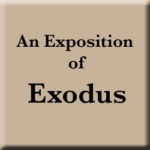Podcast: Play in new window | Download (Duration: 40:57 — 18.8MB)
Subscribe: Apple Podcasts | Email | TuneIn | RSS

This exposition of Exodus 7:8-13 by Pastor Rod Harris was delivered at Trinity Baptist Church on Sunday morning, July 8, 2018.
Intro:
It was a titanic battle. In one corner, Pharaoh of Egypt, the most powerful man on earth. In the other, Moses, the reluctant leader of a race of slaves recently returned from the back side of the desert.
[sections collapse="always"][section title="Read More"]
Pharaoh perched upon his massive throne, surrounded by the riches of a great empire. Moses, accompanied by his brother, carrying a stick. Those present would hardly think it significant let alone some great battle. Those of us reading the biblical account know better. This is an epic showdown. Not because it involves a great king and a nomadic shepherd. It’s not a great battle because it involves a great champion and an overwhelming underdog. It is a great battle because of the forces behind the battle. This really isn’t Moses versus Pharaoh. This is the God of the Hebrews versus the gods of the Egyptian pantheon. This is a showdown between the true and living God and the forces of Satan. Our text this morning is found in the seventh chapter of Exodus.
Text: Exodus 7:8-13
What’s the “Big Picture?” God is sovereignly at work saving a special people for His own glory. Exodus is God revealing himself in salvation and judgment. The fingerprint of God’s sovereignty is all over this story. It began back in Genesis with the story of Joseph. God’s favor was upon him from the beginning. Eventually he is sold, by his brothers, into slavery. But what they intended for evil, God intended for good. This was the means by which Joseph was brought to Egypt where he would rise to power. A famine brought the rest of the family years later. Over time new leadership rose to power and the Hebrews where enslaved. This too was by the will of God. Eventually a deliverer was born. By the hand of Providence this baby was preserved and uniquely equipped. Brought up in the house of Pharaoh, schooled in the wisdom of Egypt and then banished to the backside of the desert for the finishing touches, Moses, now 80 years old, has at last come to deliver his people.
Through the first 6 chapters of Exodus our God positioned himself to strike this decisive blow against Satan’s Pharaoh. God’s messengers deliver the ultimatum, “Let my people go!” Pharaoh’s stubborn refusal sets the scene for this confrontation. What follows is God’s unleashing of 10 plagues upon Pharaoh and his nation. Blood, frogs, gnats, flies, disease, boils, hail, locusts, darkness and finally death. What may seem a string of unfortunate natural disasters is in reality the hand of God heavy upon a ruler and his nation. Our text is a prologue to the coming judgment. In this prologue we are introduced to the themes that will play out in the coming drama: obedience, counterfeit miracles, God’s superior power and the perpetual hardening of Pharaoh’s heart. We must also remember that ultimately our battle is not with flesh and blood but with principalities and powers (Ephesians 6:12).
As we work our way through this passage we learn that…
Thesis: This initial face-off between Moses and Pharaoh sets the stage for the dramatic battle to follow but more importantly reveals the issues behind the ultimate battle for the souls of men.
There are three things I want us to note about this ultimate battle.
- In the battle for the souls of men our Sovereign God wastes no time declaring himself Lord of All. (7:8-10)
- All other gods are merely faint copies and ultimately prove to be inadequate and inferior. (7:11-12)
- Pharaoh’s stubborn refusal demonstrates that unbelief is a matter of the heart and not of the head. (7:13)
Conclusion:
Pharaoh’s hardened heart must serve as a warning to anyone who has witnessed Gd’s power but refuses to receive God’s grace. Pharaoh demanded a sign but when it was given, he refused to believe. Of course the trouble began with his acting as if God owed it to him to prove himself. God doesn’t owe that to any of us. But because He is gracious He gave it - and Pharaoh still refused proving that the unbeliever’s problem is not intellectual but spiritual.
His problem is not in his head but in his heart.
The need is a change of heart.
The hard heart must be replaced with a soft heart, made righteous by the grace of God.
Such is the gracious work of God through the faithful preaching of the gospel.
[/section][/sections]
